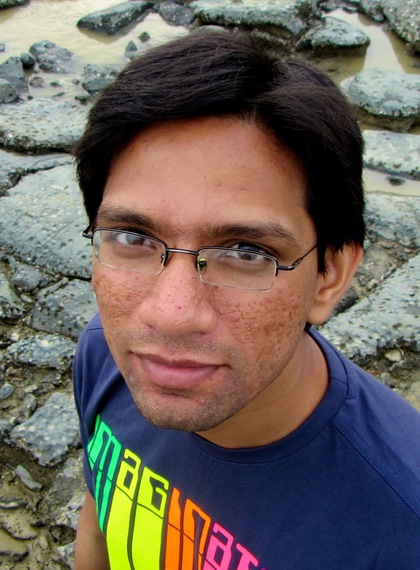
When I ask Shakhawat Hossain if it's true that he's the first openly gay Bangladeshi, he quietly demurs. "Lately more Bangladeshis are coming out to their families, and they're a lot more courageous than me."
The bespeckled, young activist is in the U.S. as part of his four-month Community Solutions fellowship, where he's being hosted by the Brooklyn Community Pride Center and contributes his expertise as the organization's Events and Communication Coordinator. Back home, he works on advocacy and community mobilization at Boys of Bangladesh (BoB), the oldest organization for gay men in the country.
He's especially interested in meeting early American LGBT rights activists and organizers during his time here. "If you go back 50-60 years in the U.S., it's directly relevant to where Bangladesh is now in terms of LGBT rights." Same-sex relations, for example, are still illegal in Bangladesh due to Section 377 of the penal code, a British colonial holdover.
But Shakhawat is quick to point out that any comparison between our two countries' movements only goes so far. "We have to find our own way," he states. "Marriage equality is not the goal. Protecting individuals from violence and persecution is." He also worries that following the Western model of identity politics could cost Bangladeshi society some of its fluidity, and, for example, expressions of masculinity might become more rigid.
So, what is the struggle for lesbian, gay, bisexual, and transgender rights like in his home country? "I'm not sure you can say there is an LGBT movement in Bangladesh," he considers aloud. He speaks of the need to mobilize LGBT Bangladeshis, increase visibility, and build community. "How do we make us stronger? What resources and support do we need?"
There are only two organizations working on LGBT issues in country, his group, Boys of Bangladesh, and Bandhu Social Welfare Society (BSWS), which works primarily with men who have sex with men (MSM) and hijras (third-gender individuals). "There are no lesbian organizations in Bangladesh, not even informal ones," he notes.
Shakhawat describes how the general political volatility of Bangladesh makes it difficult for long-range planning. Despite this, progress is being made. Dr. Muhammad Yunus, a Bangladeshi Nobel Peace Prize laureate, The Human Rights Forum on Bangladesh, a coalition of 17 human rights organizations, and Dhaka Tribune, a leading English language daily, have all called for the decriminalization of same-sex relationships. And just recently, the government has officially recognized hijras as a third gender.
Where does the work go from here? Shakhawat describes the importance of creating alliances among indigenous people, women's organizations, and other human rights groups. "Our work right now is to reach out to as many people and as many organizations as possible, to find allies both within and outside the country."
"The whole point is social justice," he states. "The LGBT movement is just one of the tools to move toward the society we want to see."
Community Solutions is a program of the Bureau of Educational and Cultural Affairs of the U.S. Department of State and is implemented by IREX.
